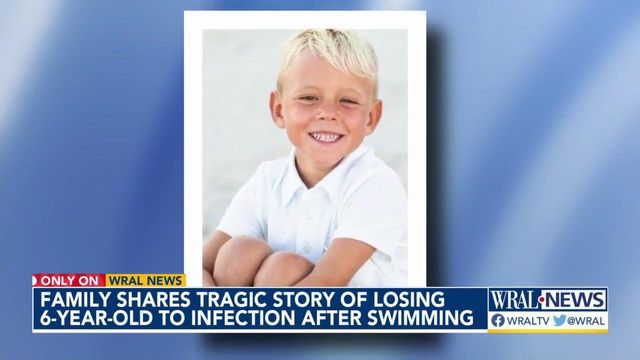Parents of child lost to brain-eating amoeba fight to keep others safe
This weekend, families and children will be going to the lake, swimming and having fun this Memorial Day. A Wake Forest family hopes you will hear their story before you do. In August, they lost their 6-year-old after a swim.
Posted — UpdatedA Wake Forest family hopes you will hear their story before you do. In August, they lost their 6-year-old after a swim.
The family has a warning to other parents.
"Just the sweetest little boy you could ever, ever imagine," said Debra Moffat, mother to Aven Moffat.
Aven's smile tells his story.
"He loved life," Debra Moffat said. "He loved his family. He loved his friends."
Like many other 6-year-old boys, he was always outside. Aven was into baseball, fishing, searching for frogs and swimming.
Little did Debra and Craig Moffat know, one of those dips in a pond would take Aven’s life.
"One day of fun is not worth what we’re going through now and if we had known, we never would have let our child get in fresh water," Debra Moffat said.
It started with a headache, then Aven started vomiting and had a high fever.
"The first urgent care that we went to, they assumed he had COVID," Debra Moffat said. "Then they did a flu test, and they said, 'No, he’s negative.'"
"They’re like, 'Oh no, it’s strep,'" said father Craig Moffat. "They had no idea."
"Just the rapidity with which this occurred was really striking," said Dr. Benny Joyner with UNC Pediatric Critical Care.
Joyner and a team of medical experts at UNC did what they could, but an amoeba from the water had entered Aven’s brain, causing an infection which could not be stopped. Within about a week from going swimming, Aven died.
But never in anyone's wildest dreams did they think that it would be this amoeba. Since it was not on the doctor’s minds, it surely wasn’t on the minds of the Moffat family.
"The first few months were really hard," said Craig Moffat. "It still is because it hasn’t been that long ... I think without faith, we’d probably be in a pretty dark place."
"New Year’s hit me hard," Debra Moffat said. "I wasn’t expecting New Year’s. but it was the realization that we would never have another year that he was with us."
They find strength through their unimaginable pain to put Aven front and center every day.
"For me, it gives me a purpose," Debra Moffat said. "Getting to talk about him, getting to share his story."
Through chicken fundraisers, fun days and toy drives, they are now funding projects, like a billboard, to warn other parents.
"Just being aware no matter where you’re taking your kids - that the places that we think are safe aren’t always," Debra said. "We had never even heard of it. We had zero idea."
Naegleria fowleri is prevalent in all bodies of fresh water, not salt water, and water not chlorinated properly. Drinking the contaminated water doesn’t hurt you, it’s when the amoeba enters your nose that it can migrate to the brain.
Many cases have been traced back to water sports and children jumping or diving into water.
"The only way you can get infected by the amoeba is for it to go up into your nose," Craig Moffat said. "If you are going to go into fresh water and you’re not sure, put the nose plugs on or keep your head above the water."
The first check from the Moffat’s foundation, $25,000, went to UNC Children’s Hospital.
"It’s hard to see those doctors and nurses, but also, it’s awesome, because we know that it’s going to make a difference," Debra Moffat said.
Through tears and applause, nurses and doctors who treated Aven plan to learn from him.
"I think the biggest aspect or the biggest lesson I’ve taken away from it is early recognition is key," Joyner said. "I think another thing that has really crossed my mind, that has kept me up at night, frankly, how do I ensure that this doesn’t happen again?"
It’s Aven’s legacy.
"You know, he always told people he wanted to be a doctor," Debra Moffat said. "And he wanted to save other babies and I think that’s what he’s doing now.
"He didn’t give up anything so we can’t either. It’s hard. We miss him."
Related Topics
• Credits
Copyright 2024 by Capitol Broadcasting Company. All rights reserved. This material may not be published, broadcast, rewritten or redistributed.





